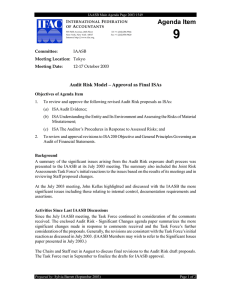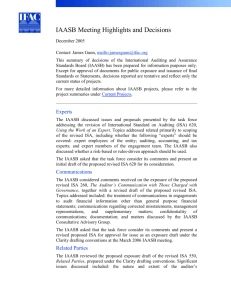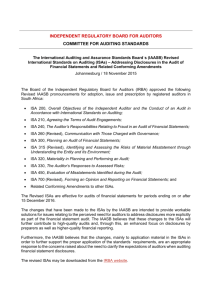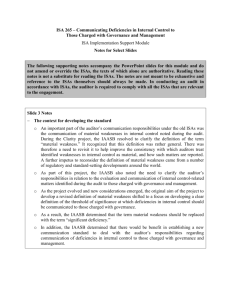FRC Invitation to Comment on IAASB Exposure Draft (July 2015)
advertisement
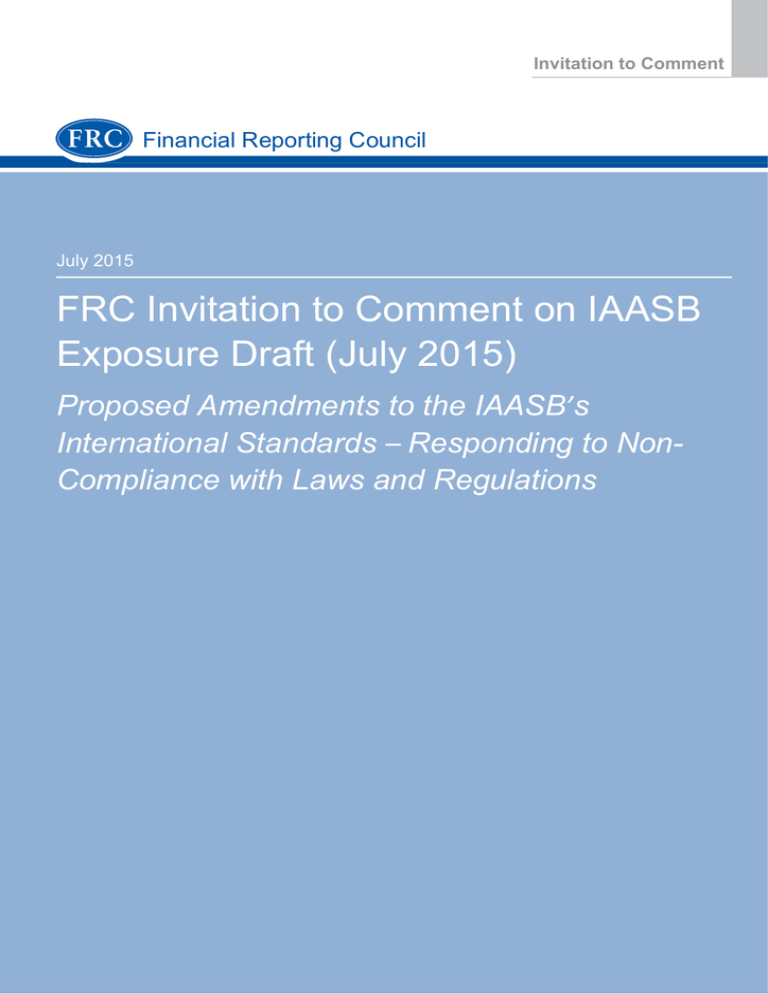
Invitation to Comment Financial Reporting Council July 2015 FRC Invitation to Comment on IAASB Exposure Draft (July 2015) Proposed Amendments to the IAASB’s International Standards – Responding to NonCompliance with Laws and Regulations The FRC is responsible for promoting high quality corporate governance and reporting to foster investment. We set the UK Corporate Governance and Stewardship Codes as well as UK standards for accounting, auditing and actuarial work. We represent UK interests in international standard-setting. We also monitor and take action to promote the quality of corporate reporting and auditing. We operate independent disciplinary arrangements for accountants and actuaries, and oversee the regulatory activities of the accountancy and actuarial professional bodies. The FRC does not accept any liability to any party for any loss, damage or costs howsoever arising, whether directly or indirectly, whether in contract, tort or otherwise from any action or decision taken (or not taken) as a result of any person relying on or otherwise using this document or arising from any omission from it. © The Financial Reporting Council Limited 2015 The Financial Reporting Council Limited is a company limited by guarantee. Registered in England number 2486368. Registered Office: 8th Floor, 125 London Wall, London EC2Y 5AS FRC Invitation to Comment on IAASB Exposure Draft (July 2015): Proposed Amendments to the IAASB’s International Standards – Responding to Non-Compliance with Laws and Regulations Background 1. The International Auditing and Assurance Standards Board (IAASB) has recently exposed proposed limited amendments to several IAASB International Standards in relation to the International Ethics Standards Board for Accountants’ (IESBA’s) revised exposure draft (ReED), Responding to Non-Compliance with Laws and Regulations.1 2. In August 2012 IESBA released an ED, Responding to a Suspected Illegal Act.2 The ED proposed enhancements to the IESBA Code of Ethics for Professional Accountants (IESBA Code) dealing with the professional accountants’3 response in situations where they come across an act or suspected act of non-compliance with laws and regulations (NOCLAR). Such an act may have been committed or may be about to be committed by the client or employer, or by those charged with governance (TCWG), management or employees of the client or employer. 3. IESBA revised their proposals following stakeholder feedback, and in May 2015 issued the Re-ED. Comments on the Re-ED have been requested by 4 September 2015. IESBA is also undertaking a project, due to be completed by the end of 2016, to restructure the IESBA Code in order to improve the clarity and usability of the Code. IESBA are aiming to close off the proposed NOCLAR standard under its extant drafting conventions (termed a “close-off document”), with the intention of restructuring the close-off document in accordance with the new drafting conventions of the restructured IESBA Code once they are finalised. 4. The IAASB believes that it is in the public interest that the IAASB International Standards and the IESBA Code “operate in concert”. The IAASB further believes that their standards should not undermine or contradict any enhancements that will be made to the IESBA Code, either through inconsistencies or through failing to draw appropriate attention to the revised requirements in the IESBA Code. Accordingly, the IAASB ED includes proposed limited amendments to the ISAs and ISQC1 that the IAASB believes are necessary to resolve any actual or perceived inconsistencies or to clarify and emphasise key aspects of the IESBA NOCLAR proposals. 5. The Appendix highlights the main reasons for the proposed limited amendments to the IAASB International Standards and those affected. 6. Further details of the proposed changes and an overview of the matters addressed by the IAASB in their consideration are presented in the IAASB’s Exposure Draft which can be downloaded from the IAASB’s website4. Invitation for Additional Input 7. Notwithstanding that consultations undertaken as part of developing the IAASB’s current Strategy and Work Plan had not demonstrated that ISA 250 warranted immediate revision, the IAASB is of the view that there is benefit in soliciting stakeholders’ views as to whether there is merit in exploring other aspects of ISA 250 where further improvements may need to be considered in due course. The IAASB notes that if respondents are of the view that a more fulsome review of ISA 250 would be beneficial in due course, this would be considered through their normal consultation process on future Work Plans. 1 http://www.ifac.org/publications‐resources/responding‐non‐compliance‐laws‐regulations 2 https://www.ifac.org/publications‐resources/responding‐suspected‐illegal‐act. The FRC response to that consultation paper can be found by following this link 3 Professional accountant includes an auditor or an assurance practitioner. 4 http://www.ifac.org/system/files/publications/files/IAASB-Exposure-Draft-Proposed-NOCLAR-Amendments_0.pdf Financial Reporting Council 3 8. The IAASB includes examples5 of matters where further consideration may be viewed as beneficial in the exposure draft. For example, whether the existing distinction between the types of laws and regulations and the different levels of work effort applied to each warrants further investigation or revision. 9. Further details on the IAASB’s invitation for additional input can be found in paragraphs 14 to 18 of the explanatory memorandum presented in the IAASB’s Exposure Draft. Responding to the FRC 10. The FRC welcomes comments on the IAASB’s Exposure Draft to assist the FRC in developing a response to the IAASB and, in due course, to assist the FRC in developing proposals to adopt the proposed changes to update the corresponding ISAs (UK and Ireland) and ISQC (UK and Ireland) 1 when the changes to the IAASB International Standards are finalised. In general, the FRC seeks to base the ISAs (UK and Ireland) and ISQC (UK and Ireland) 1 on the standards issued by the IAASB, where necessary, subject to augmenting the standards to address specific UK and Ireland legal and regulatory requirements and other matters that are appropriate in the UK and Ireland national legislative, cultural and business context. 11. In particular, the FRC welcomes comments on the following: a) The questions posed by the IAASB which are set out on page 8 of the Exposure Draft. b) Whether and, if so, how the FRC should adopt the proposed changes (assuming they were to be issued as final standards by the IAASB) through amendment to the ISAs (UK and Ireland). c) Whether a more fulsome review of ISA 250 would be beneficial in due course, including those matters that respondents believe need to be considered in any future revision of ISA 250. To assist in developing its response to the IAASB, the FRC would welcome comments from interested parties on the Exposure Draft by 19 September 2015. Comments, preferably in an electronic form that facilitates “copy and paste”, may be sent by e-mail to aat@frc.org.uk. If this is not possible, please send written comments to: Josephine Jackson Audit and Assurance Team Financial Reporting Council 125 London Wall LONDON EC2Y 5AS Interested parties are also encouraged to comment on the Exposure Draft directly to the IAASB before its deadline for comments. 5 Paragraph 16 of the Explanatory Memorandum 4 FRC Invitation to Comment on IAASB Exposure Draft (July 2015) Appendix Nature of the Proposed Limited Amendments—International Standards Affected A summary of the proposed amendments to the IAASB’s International Standards is set out in the table below. Nature of proposed limited amendments Amendments to reflect changes to the auditor’s duty of confidentiality, particularly the legal or ethical duty or right to disclose identified or suspected NOCLAR to an appropriate authority, set out in the IESBA’s NOCLAR proposals. For example, proposed amendments to certain paragraphs in the International Standards to replace a generic term such as “responsibility” (i.e. “the auditor shall determine whether the auditor has a responsibility to report the identified or suspected NOCLAR ..”) with a more specific phrase (“legal or ethical duty or right”) to give appropriate emphasis to the proposed change in the IESBA Code. New guidance to emphasise the implications of the IESBA’s NOCLAR proposals on the auditors’ responsibilities under ISA 250. International Standards Affected ISA 2406 paragraph 43 ISA 240 paragraph A65 ISA 2507 paragraph 28 ISA 250 paragraph A19 ISQC18 paragraph A56 ISRE 24009 paragraph A92 ISAE 340210 paragraph A53 ISA 250 paragraph A12a ISA 250 paragraph A17 ISA 250 paragraph A18a For example, if the auditor becomes aware of NOCLAR that the auditor is required to address, such non-compliance is relevant to the auditor’s responsibilities in accordance with ISA 250 paragraphs 18 to 21. (E.g. such non-compliance may cause the auditor to evaluate the integrity of management and, when appropriate, those charged with governance, even if the non-compliance does not have a direct material effect on the financial statements). Amendments that draw attention to key aspects of the IESBA’s NOCLAR proposals. ISA 240 paragraph 8a ISA 250 paragraph 8a For example, auditors may have additional responsibilities under relevant ethical requirements regarding an entity’s NOCLAR. Complying with those additional responsibilities may provide further information that is relevant to the auditor’s work in accordance with the ISAs. 6 ISA 240, The Auditor’s Responsibilities Relating to Fraud in an Audit of Financial Statements 7 ISA 250, Consideration of Laws and Regulations in an Audit of Financial Statements 8 ISQC 1, Quality Control for Firms that Perform Audits and Reviews of Financial Statements, and Other Assurance and Related Services Engagements 9 ISRE 2400 (Revised), Engagements to Review Historical Financial Statements 10 ISAE 3402, Assurance Reports on Controls at a Service Organization Financial Reporting Council 5 Nature of proposed limited amendments International Standards Affected New guidance that highlights a requirement in the IESBA’s NOCLAR proposals that, in the case of an audit of financial statements, a professional accountant shall request the existing accountant to provide known information regarding any facts or circumstances that, in the existing accountant’s opinion, the proposed accountant needs to be aware of before deciding whether to accept the engagement. The term “predecessor auditor” is used instead of “existing accountant” to be consistent with extant terminology in the ISAs. ISA 220 paragraph A8a New guidance to recognize that laws or regulations may prohibit alerting (“tipping off”) the entity when, for example, the auditor is required to report a NOCLAR to an appropriate authority pursuant to money laundering legislation. Other changes, such as additional examples, explanatory material, or alignment of phraseology, which the IAASB believes would significantly clarify the application of its International Standards in light of the IESBA’s NOCLAR proposals. ISA 250 paragraph A5a ISA 250 paragraph A16 ISA 250 paragraph 5 For example, the addition of examples of categories of laws and regulations (e.g. Securities markets and trading laws and regulations) drawn from the IESBA NOCLAR Re-ED. 11 ISA 260 (Revised), Communication with Those Charged with Governance 12 ISA 450, Evaluation of Misstatements Identified during the Audit 6 FRC Invitation to Comment on IAASB Exposure Draft (July 2015) ISA 240 paragraph A59A ISA 250 paragraph A15 ISA 26011 paragraph 7 ISA 45012 paragraph A8 Financial Reporting Council 8th Floor 125 London Wall London EC2Y 5AS +44 (0)20 7492 2300 www.frc.org.uk
